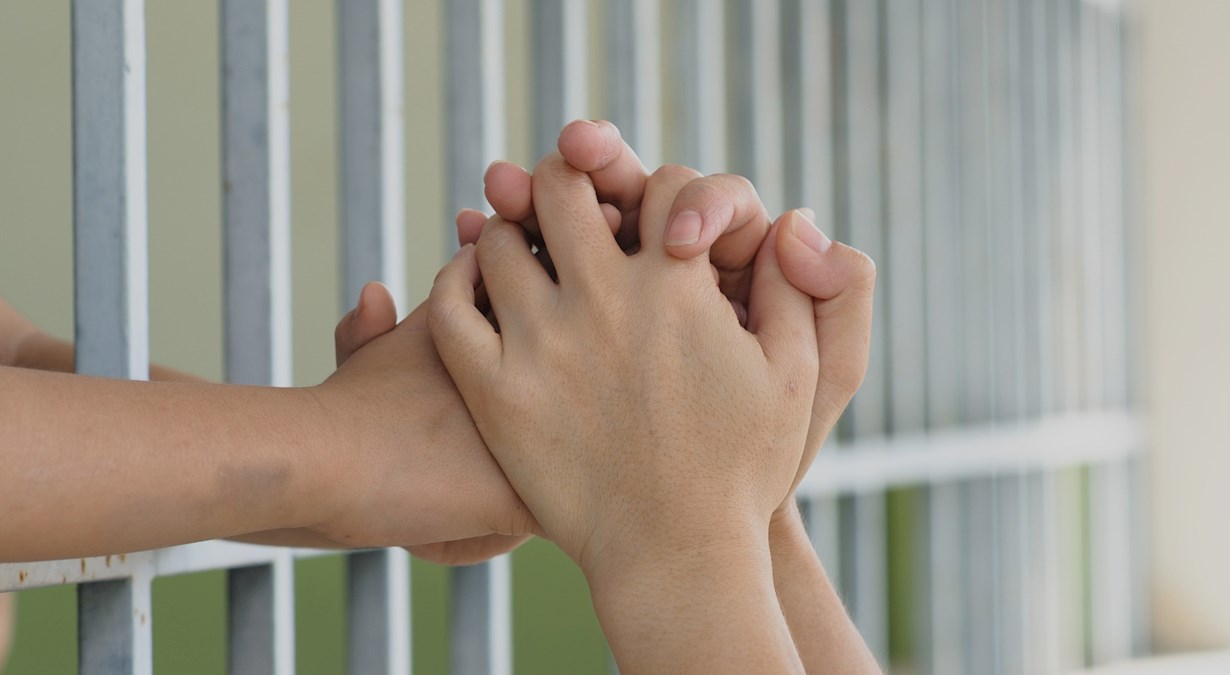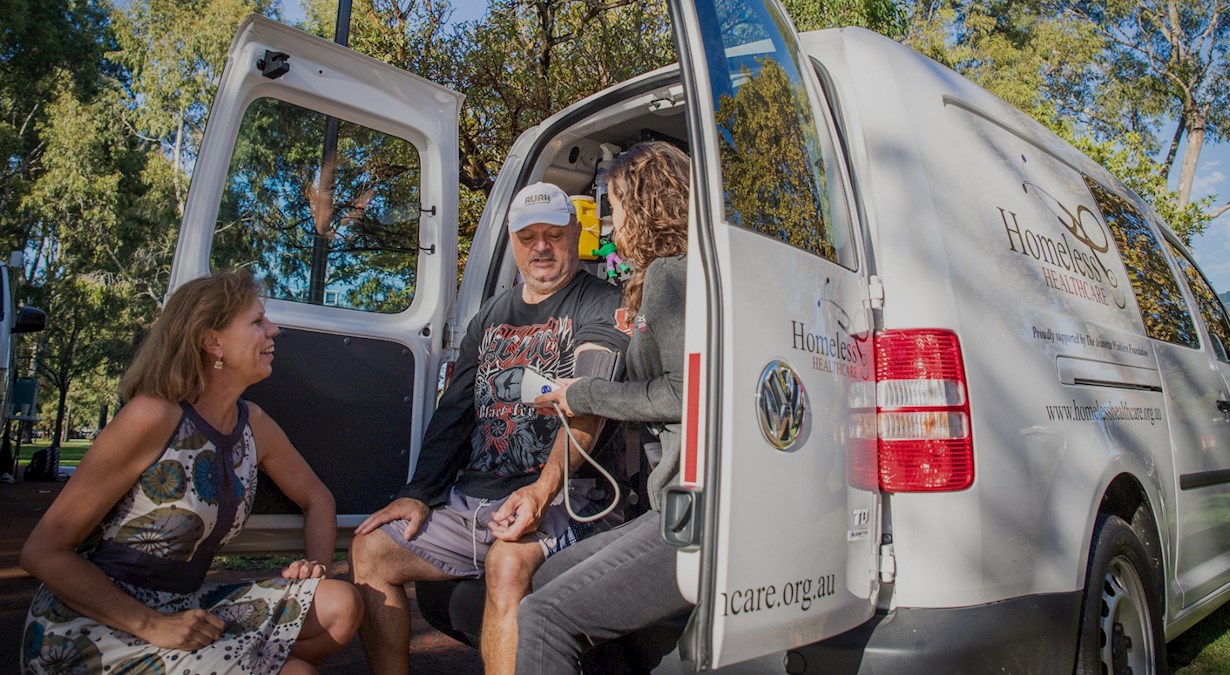PROJECT
Homeless Healthcare and Royal Perth Hospital Homeless Team Evaluation
Latest evaluation report released
The second UWA evaluation report on the work of the RPH Homeless Team was released on February 26 2019, and documents the work and impact of the team since it commenced in June 2016. In its first two and a half years of service delivery, the Team provided support to 1014 patients, many with multiple complex health issues exacerbated by surviving on the streets. View the summary (PDF 0.8MB) or full report (PDF 7.5MB).
Comparing patient hospital use before and after contact with the RPH Homeless Team, fewer people were presenting to ED and there were significant reductions in inpatient admissions at EMHS Hospitals, equating to a cost saving of around $4,600,000.
As reflected in this report, there has been growing recognition of the RPH Homeless Team nationally and internationally over the last year, and a number of interstate organisations have recently visited Perth to see the work of the Team in action, with a view to adapting the Homeless Healthcare model for their own jurisdiction. With ever escalating strain on hospitals and health systems around Australia, the commendation from the Australian Academy of Emergency Medicine is particularly powerful.
EDs are increasingly strained across Australia and there is urgent need for innovative ways to address the high rates of ED presentations among people who are homeless. Over two and a half years, Royal Perth Hospital’s Homeless Team has demonstrated how a hospital can break the cycle of homeless people presenting to emergency departments. Most EDs are only resourced to respond to immediate medical issues, with homeless people then discharged back to the streets. The UWA evaluation shows that tailored care and linkages with GPs and follow up care in the community is reducing ED re-presentations and lengthy inpatient admissions. The homeless team has been proactive in connecting rough sleepers with stable housing and support, and once housed, other health and social issues can be addressed. This is a program that needs recurrent funding and should be rolled out across Australia.
Australasian College for Emergency Medicine, February 2019
Breaking the revolving door between homelessness and health
The Homeless Healthcare and Royal Perth Hospital Homeless Team Evaluation connects a number of groups to examine homelessness in Perth and related hospitalisations for this vulnerable group in society.
Beginning as a small collaboration grant to evaluate Homeless Healthcare (HHC) over 18 months, a working relationship developed between our research team, HHC, Royal Perth Hospital (RPH), WA Health and the homelessness sector.
The research was then expanded in response to evidence and policy gaps, and results sharing has been driven by the high-priority needs of our partners.
Emerging findings demonstrate the enormous scope to reduce chronic disease and preventable hospitalisations among people in Perth who are homeless.
The main goal of this research project is to explore the health disparities, suffered by people experiencing homelessness, through a social determinants lens.
HHC is a primary health service for people experiencing, or at risk of, homelessness. It offers a variety of services to help people experiencing homelessness in Perth.
These include:
- Street health: HHC nurses provide medical care in public places within the Perth CBD to target rough sleepers’ medical needs
- Mobile GP: Clinics are provided at homeless drop-in centres throughout the Perth CBD
- After-hours support: 24-hour support program provided to 50 Lives 50 Homes clients
- RPH in-reach: Supports patients and connects them with community services.
Project goals
Identify barriers to primary and preventative healthcare for people experiencing homelessness
Evaluate the impact of HHC services and the RPH Homeless Team on health service usage and outcomes of people experiencing homelessness
Advocate for patient-centred, trauma-informed healthcare
Research team leaders: Associate Professor Lisa Wood and Research Officer Shannen Vallesi
Our project focuses on the ways our social and built environments impact on health, with a particular focus on mental health, homelessness, social determinants of wellbeing, and reducing health inequalities.
All our projects have common underlying themes relating to prevention of ill-health and health disparities, reducing barriers to health (be they social, environmental or behavioural), and bridging divides between research, policy and practice.
We are passionate about undertaking research that is relevant to the real world and can make a tangible difference to reducing health inequalities.
If you would like to learn more, contact Associate Professor Lisa Wood.
From pets to homelessness
News
WA must spend on homelessness to save money
If we start thinking in terms of publicly funding people rather than government departments, the cost of housing stops being seen as a challenge to be overcome but instead might become an opportunity to be taken.
Read moreMedics for homeless in funding plea
The Street Health program, which has been run by Homeless Healthcare for the past 18 months, is staffed by nurses and outreach workers and operates on weekday mornings. Nurses provide basic medical care such as wound dressings and blood pressure and diabetes checks.
Read more‘Street Health’ nurses selected as finalists in HESTA national nursing awards
Nurses from Homeless Healthcare’s innovative ‘Street Health’ pilot project have been selected as finalists in the HESTA Australian Nursing Awards.
Read moreCollaboration and funding
We receive funding from the following organisations in support of our research into homeless and health outcomes:
- Homeless Healthcare
- Royal Perth Hospital
- East Metropolitan Health Service
- School of Population and Global Health Linkage Grant
- The Beacon, Salvation Army





